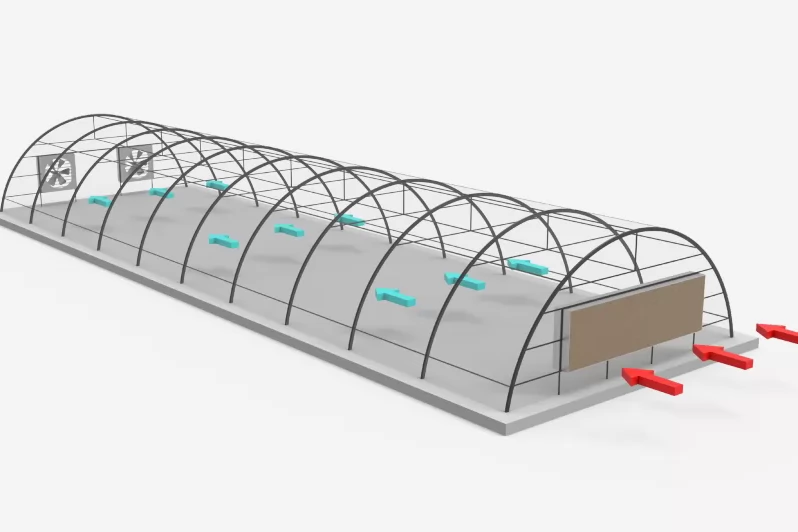Evaporative Cooling Systems for Agriculture and Livestock
Efficient Climate Control with Evaporative Cooling Systems for Agriculture and Livestock
In today’s agricultural landscape, maintaining optimal environmental conditions is a cornerstone of productivity and sustainability. Whether managing a poultry farm, greenhouse, or livestock operation, heat stress and poor ventilation can severely impact growth, yield, and animal welfare. Evaporative cooling systems have emerged as a reliable and cost-effective solution for tackling these challenges, offering significant advantages over traditional cooling methods.
Addressing Heat Stress in Poultry Farms
High temperatures in poultry farms can lead to reduced feed intake, slower growth rates, and even increased mortality among flocks. Birds lack sweat glands, which makes them particularly vulnerable to heat. Evaporative cooling systems provide an effective way to lower ambient temperatures by leveraging the natural process of water evaporation. When warm air passes through water-saturated cooling pads, it loses heat and becomes cooler before circulating throughout the facility. This creates a more stable and comfortable environment, allowing poultry to thrive even during the hottest months.
Beyond temperature control, these systems also improve air quality by reducing airborne dust and ammonia levels. Cleaner air minimizes respiratory issues in birds, leading to better overall health and higher production rates.
Boosting Greenhouse Efficiency
In greenhouses, maintaining the right temperature and humidity levels is critical for healthy plant growth. Excessive heat can cause plants to wilt, slow their development, or even result in crop failure. Evaporative cooling systems help growers overcome these obstacles by delivering consistent cooling and humidification.
The process not only keeps temperatures in check but also raises relative humidity, which is essential for many crops. For instance, leafy greens and flowers often perform better in humid conditions that prevent excessive water loss through transpiration. By fine-tuning the microclimate, growers can achieve higher yields and superior crop quality, even in regions prone to extreme heat.
Enhancing Livestock Comfort
Heat stress doesn’t just affect poultry; livestock such as cows, sheep, and goats are also vulnerable to high temperatures. Prolonged exposure to heat can reduce feed conversion efficiency, lower milk production, and even lead to reproductive issues. Evaporative cooling systems mitigate these risks by creating a cooler, more comfortable environment for animals.
For dairy farms in particular, keeping cows within their thermal comfort zone is directly linked to milk yield. Studies have shown that proper cooling measures can increase milk production by up to 10-20% during the summer. Furthermore, stress-free animals exhibit improved behavior, making them easier to handle and care for.
Economic and Environmental Benefits
Compared to traditional air conditioning systems, evaporative cooling offers significant energy savings. By utilizing water and airflow rather than refrigerants, these systems require less power to operate, reducing energy costs for farm owners. They are also environmentally friendly, as they produce no greenhouse gas emissions during operation.
The modular design of modern evaporative cooling systems ensures scalability, allowing farmers to tailor installations to their specific needs. This flexibility makes them a smart investment for operations of all sizes, from small family farms to large commercial enterprises.
Why Choose Evaporative Cooling?
The adoption of evaporative cooling systems goes beyond mere temperature control. These systems are an essential tool for enhancing productivity, safeguarding animal welfare, and ensuring sustainable farming practices. With the right system in place, agricultural operations can unlock their full potential, even under the pressures of rising global temperatures.
If you’re looking to optimize your farm’s performance while minimizing operational costs, consider integrating an evaporative cooling system tailored to your specific requirements. By doing so, you’ll be investing in a solution that pays dividends in productivity, efficiency, and long-term sustainability.







